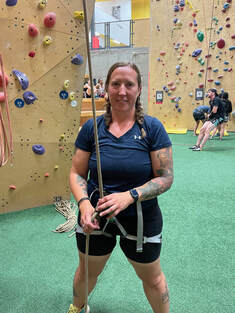 The Message How does a weary world rejoice? This week is the last week in our sermon series addressing this question. And in this final week, we answer this question with “we root ourselves in ritual.” As I was thinking about the theme this week and reading the scriptures, I realized that, at least for me, it doesn’t feel like rooting myself in ritual would help me rejoice through my weariness. And this could be partially because I just moved here not too long ago, and this was my first Christmas in a totally new place and with a totally new church, and it just didn’t feel like I’ve established any rituals yet. But as I thought more about it, I realized that I actually do root myself in ritual, often without even realizing it, if we can expand on our definition of ritual for a moment. When I go to bed at night, I always get into bed on the same side, and I stay on that side all night, even though the rest of the bed is empty – except of course when Kanyon decides to sleep on the bed, too. When I wake up in the morning, I always get out of bed and immediately tidy up the side of the bed I slept in. I prepare myself to take the dogs outside, and then I take them outside using the same morning ritual every day. Partially I do this for the benefit of my dogs – they know what to expect if we do things the same way every day. But, they’re adaptable. Mostly, I do these rituals for myself. I can be on autopilot if I maintain a morning ritual that makes sense to me. After I finish with the dogs, I go to the bathroom, and brush my teeth. I don’t know if you all do this too, but I use the same pattern for brushing my teeth every single time I do it. If for some reason that pattern would change, I would feel so strange that I am not even sure what I would do! At this point, my morning ritual might change depending on what my day looks like. But even still, there are so many things that I do throughout the day in exactly the same way every time I do them. And I realized as I was thinking through this notion of rooting ourselves in ritual, that we likely do this because it helps us feel comfortable and safe. It also helps us to be able to let go of putting a lot of effort into thinking too much about things that we can put onto autopilot. I never think about which leg to put into my pants first when I put them on. To be honest, I am not even sure which leg I do first, but I am sure I do it the same way every time and I don’t even realize it. So, even on a very basic level, there is comfort and possibly even joy in the very simple rituals we perform on a regular basis. But of course, when we talk about ritual, especially as it relates to religious or spiritual rituals, we are typically referring to something very different. And yet, also similar, at least in terms of how religious or spiritual rituals make us feel. In our scripture today, we heard that eight days after Jesus was born, his parents participated in a naming ritual. Then, following the ritual demanded by the Law of Moses, they “took Jesus to the temple in Jerusalem and presented him to the Lord.” They then offered a sacrifice on his behalf. It might be hard for us to relate to this ritual today, or to understand how participating in it helped them to find joy. But when we think about other religious rituals that we participate in that help ground us in our faith, or bring comfort when we are troubled, or simply bring a sense of nostalgia, comfort, and safety, we can see why and how these types of rituals benefit people – then and now. How thrilled would we all be to witness a baptism in our church? That would be amazing, and there would be tons of joy – not just for the parents, but for all the members of our church. When we accept the grace of God and remember the sacrifice of Jesus through Holy Communion, it can bring a sense of joy and peace to many who participate. But, even if sacramental rituals do not do much for you personally, most of us feel comforted by the ritual of a candlelight Christmas Eve service. Or, we feel comforted by reciting the Lord’s Prayer, which is another ritualized prayer that is almost on autopilot for those who learned the prayer as a young person. Religious rituals are fascinating because often, we find them so meaningful, or we feel so attached to them, that we struggle to change them or adjust to something new. I have a hard time when other churches recite the newer words to the Lord’s Prayer. I learned “forgive us our trespasses as we forgive those who trespass against us.” When I hear another version – “forgive us our sins as we forgive those who sin against us,” or something different, my brain can’t adjust very easily. And yet, if that was the version this church used regularly, I would accommodate and change my ritual. So, I would encourage you to think through your own rituals – both personally and spiritually. What rituals are meaningful to you? Have any changed over the years? Are there any you miss or long for? Sometimes, we don’t even realize a ritual has changed until we are taken back to it somehow, and we fall into a comfortable pattern that we haven’t been in for years. This happened to me during COVID when my grandmother passed away. I went to her funeral, which was held in a Catholic church. I will admit that there are things I do not necessarily appreciate about the Catholic church. But, there are things that I very much loved about being at her funeral, and many of them had to do with the rituals that I remember from my childhood in the Catholic church. Even though I wasn’t magically convinced to switch denominations permanently, I felt a sense of calm and peace and yes, even joy, when I was taken back to some of those Catholic rituals I learned and witnessed as a kid. Those rituals helped with my grief, they helped me to feel connected to my grandmother and my family, and they helped me to find a sense of peace and joy, even through the sadness and the weariness of losing someone I loved dearly. So rituals are important, and in times of need or times of distress, overwhelm, or weariness, we tend to fall back on our rituals. I did not realize how many rituals I participate in, both on a personal level and on a spiritual level, on a daily basis. But, now that I have thought through it a bit, I do realize how much rituals and patterns of behavior affect our daily life. I can see how rooting ourselves in these rituals of spiritual or personal comfort can be helpful when we become overwhelmed. I can also see how it might be easy to root ourselves in unhealthy rituals or patterns of behavior as well. So, as you leave here today, I encourage you to become more aware of the rituals you participate in regularly. Recognize those rituals that bring you life and energy, and become aware of those that might drain life or energy from you as well. And then, bring those that give you life and energy to the front of your consciousness when you feel weary, run-down, or overwhelmed. Learn to rejoice through use of rituals that bring life and energy to your spirit. Sing praise to God for the joy that these rituals bring, and experience joy through the process. So, how does a weary world rejoice? We acknowledge our weariness. We find joy in connection. We allow ourselves to be amazed. We sing stories of hope. We make room. And we root ourselves in ritual. May you leave here today armed with tools to help you rejoice through your weariness, and to help others do the same. Amen. Let us pray. God of hope and joy, today we are grateful for the lessons in the Gospel of Luke that help equip us with ways to rejoice in a weary world. We ask for your guidance and wisdom in helping us to find out own ways to rejoice and experience joy through our weariness as we move through our own lives. God, sometimes we don’t even recognize how weary we are, so we ask that you would help us to acknowledge our weariness when we are struggling to see and know it. We are grateful for the people around us who are there to provide connection, and we pray that you would guide us to community when we feel weary and need to find joy in connecting with others. We ask that you help us to allow ourselves to be amazed - that you would help us not to forget to take the time to see and know the amazing things around us. And we ask that you would help us to sing our stories of hope. God, we also need your help to make room - for you, for Jesus, for other people, and for ourselves. Finally, God, we thank you for helping us root ourselves in rituals. We thank you for the rituals we learned as young people, and for the more recent rituals that help us experience joy and give us life and energy. God, you amaze us every day, and our gratitude is eternal and unending. We pray all of this in your name. Amen.
0 Comments
 The Message There are many lessons in the Christmas story. We can, and often do, preach on these verses in the Gospel of Luke every year at Christmas, and each year, we could say something different about it. This year, I want to talk about hospitality. For those of you who have not been to our Advent services, we have been addressing the question, “How does a weary world rejoice.” The first week of Advent we talked about acknowledging our weariness. After that, we talked about finding joy in connection, and then allowing ourselves to be amazed. This morning, we talked about singing stories of hope. And tonight, we’re going to talk about making room. Opening ourselves to the presence of God and welcoming Jesus into our hearts. We’ve read Chapter 1 of the Gospel Luke in its entirety, and we’ve heard the story of Zechariah and Elizabeth and the miraculous conception of John the Baptist. We’ve heard the story of Mary, an unmarried virgin, who becomes pregnant by the Holy Spirit. Through both of these stories, we have heard about the radical hospitality that these people demonstrated. Elizabeth and Zechariah made room in their hearts for a child – a child they believed impossible. They had closed their hearts and their minds to the possibility of ever having children. Their hearts had hardened, they’d built walls to protect themselves and to try to overcome their shame and their guilt. But as soon as they learned that they would be blessed with a pregnancy, those walls around their hearts began to crumble and they made room for their son. They also made room for each other – they shared their joy and their grief over the years that they waited in shame and frustration and sadness. Meanwhile, Mary, unmarried but engaged to Joseph, was given the news that she would conceive miraculously through the Holy Spirit. Without hesitation, she made room in her heart for the movement of the Holy Spirit, for her new son, and for all the challenges this miraculous virgin birth would bring for her. Likewise, Joseph - a man engaged to a woman who becomes pregnant before their wedding and without him - could easily have decided to cast Mary and her baby aside. But he did not. He demonstrated tremendous love and trust for Mary and her son, and he made room in his heart, which must have been hurting at least a little bit. And then today, we hear how room was made on a bed of hay for Mary to give birth and for the baby Jesus to lie his head. We also heard how quickly the shepherds made room in their busy lives dedicated to their flocks to go and see the new baby that the angel told them about. You see, this entire story is a story of hospitality and making room. Despite their weariness, their shame, their guilt, their busy-ness, or the walls they’d built in their hearts, all of these people made room for the Son of God. This story then begs the question: do we make room in our own hearts? In our own lives? We are called to make room for the lonely. The hungry. The poor. The downtrodden. We are called to make room in our hearts for the stranger sitting next to us. The stranger on the street corner. The exasperated mother at the grocery store or the family next door that is struggling to make ends meet. We are called to make room for the Son of God in our hearts, our homes, and our lives. We are called to make room even when it’s inconvenient for us, when we have our own troubles and our own worries. We are called to hospitality, and these stories remind us that we are better able to make room in our hearts when we do these things in community with others. We are not on our own. The beauty of a church community is that we are surrounded by people who care about us, who love us, and who regularly make room for us. And, within that community, we love and support and lift each other up in and for Jesus Christ. Tonight, we celebrate the birth of Jesus. And in doing so, we invite hospitality and we make room in our hearts. As we turn down the lights and sing Silent Night at the end of the candlelight service tonight, I invite you to think about how you can make room in your own hearts so that, through your own weariness, you are able to rejoice. How does a weary world rejoice? We acknowledge our weariness, find joy in connection, allow ourselves to be amazed, sing our stories of hope, and we make room. Make room for love, make room for light, make room for your neighbors, your family, and your friends. Make room for each other. Make room for the ones who cannot be here with us tonight. Make room for those who feel they have no choice to but to do it all on their own. And make room for Jesus. He is the light of the world, and we can rejoice through our weariness knowing that He was born because so many people made room for Him. And He always makes room for us. Amen. Jesus, thank you for being our light in the darkness. Thank you for showing us how to make room in our hearts. Thank you for making the sacrifices you made for us. Help us to share our hospitality and make room for others in our church, in our homes, in our lives, and in our hearts. Teach us radical hospitality and help us to live by your example. Help us share our light with the world, and make room for the light of others in our own hearts. Tonight, we are grateful for the reminder of the story of your birth. We are excited to make room for you in our hearts. We are ready to light our candles and raise them in your honor as we prepare room in our hearts and our homes for you and for others. Amen.  “Young at Heart” Message As most of you know, we’ve been working through a sermon series asking the question, “How Does a Weary World Rejoice?” Today, we respond to this question with, “We Sing Stories of Hope.” I love this week’s theme because we aren’t just talking about singing songs of hope. We’re talking about singing stories of hope. To me, singing stories of hope sounds meaningful – like we’re weaving our stories into songs on the tapestries of our hearts. And this got me thinking about how young people do this. When kids go to Moravian summer camps, much of what they do is wrapped up in songs. There is tons of music (and by extension, joy) at Moravian summer camps. Young people form memories around the songs they sing at those ages. And those memories start to weave the fabric of their lives. And, I bet that for most of us here today, even if we never went to summer camps, there are some songs that have been woven into our consciousness that bring about joy and hope, or at the very least a sense of nostalgia. So, I thought it might be fun to sing one of these songs today. The song we’re about to sing is, I hope, fairly well known, but if you don’t know it, you’ll learn it quickly. And, there are some movements that go along with the song, so if there are any volunteers – young or old – who’d like to join me up front, I’d love to have you. We’ll learn the song and movements together and anyone sitting in their seats can do them, too. They’re very easy. “This Little Light of Mine” This little light of mine I’m going to let it shine Oh, this little light of mine I’m going to let it shine This little light of mine I’m going to let it shine Let it shine, all the time, let it shine Hide it under a bushel no I'm gonna let it shine Hide it under a bushel no I'm gonna let it shine Hide it under a bushel no I'm gonna let it shine Let it shine let it shine let it shine All around the neighbourhood I'm gonna let it shine All around the neighbourhood I'm gonna let it shine All around the neighbourhood I'm gonna let it shine Let it shine let it shine let it shine Don't let anyone blow it out I'm gonna let it shine Don't let anyone blow it out I'm gonna let it shine Don't let anyone blow it out I'm gonna let it shine Let it shine let it shine let it shine For many people, adults and children alike, this song is not just a song of hope – it’s a story of hope. It’s a story of hope because we all have times in our lives when it feels like someone or something has blown out our light, or we feel like we need to hide our own light from the world for whatever reason. We all have stories we could share of feeling like we’re in the dark and needing a candle of hope to bring us out of darkness. The Message So, how does a weary world rejoice? We sing stories of hope. We have been working through the first chapter of the Gospel of Luke during this series. In tonight’s Candlelight service, we will hear Luke chapter 2, verses 1-20 – the story of the nativity. But today, we heard the songs of praise and hope that Mary and Zechariah sang. Both Zechariah and Mary sang their stories of hope after long periods of waiting, and some suffering. Zechariah and Elizabeth spent most of their lives together with a feeling of shame around their inability to conceive children. In the ancient world, this is what defined a marriage and family. And, often, if a woman was unable to conceive, her husband would either leave her entirely or he would find another woman who could conceive children. It wasn’t a pleasant experience for women especially, but that pressure was a lot for men, too. We come into Zechariah’s story late in his life because that’s when the miracle of conception happens for him and Elizabeth. But I wonder what his prayers were like for all those years before, when they tried over and over again to have children and were unsuccessful. I wonder how many times he was angry with God? I wonder how many of his prayers were filled with frustration rather than hope? We get to hear his song of hope and praise at this point in his life, but I imagine the younger Zechariah struggled to sing songs of praise. And, even now, the birth of John did not look how Zechariah imagined or prayed it would look when he was a younger man. He went through some very difficult and trying times before he uttered the song we heard today. And, he had to know that the future with this child would not be easy considering his and his wife’s advanced age relative to when people typically had children. And yet, in this moment, he sings this song and praises God – not just for today’s blessing, but for the struggle and the challenges and the frustration, too. His song is not just a song – it is his story. We also heard Mary’s song today – also known as the Magnificat. Mary – a young, unwed, pregnant woman with an unknown future sings this beautiful song of praise and hope. And once again, her future does not look anything like she thought it would. I am certain she never prayed or hoped to be the mother of the Messiah. She might have prayed for a nice man, a humble man, someone to settle down with and have children. Someone who would love her and care for her and not hurt her. But she didn’t pray to conceive her child through the Holy Spirit before she was even married. That certainly complicated her life quite a bit. Tonight, we will hear her story of the birth of Jesus. But today, we hear Mary singing her story of hope for the unknown future of herself, Joseph, and her unborn child. Mary has suffered shame, humiliation, and she has asked herself a lot of questions. And yet, she rejoices through her weariness by singing her song of hope. Her story of hope. It is much more than just a song of joy. It is her story, her song, her love, her passion, and her faith in God. Both Zechariah and Mary share with us their stories of hope. When we feel weary and when we feel like our light isn’t shining as bright as we would like or when someone has blown our light out entirely, we can reignite our own flame by singing our own story of hope. Zechariah and Mary only sang their songs after going through difficult and trying times. When we are in the midst of difficulty, or when we are feeling like our light has gone out, it can be difficult to sing a song of praise to God. But in those moments, if you can grasp onto any small glimmer of hope, allow that glimmer to re-ignite your flame. Singing stories of hope invites us to weave our entire story – the good, the bad, the uncertainty, the worry, the stress, the joy – together into a song of hope and praise. Sing your story, even if it feels impossible or if it doesn’t feel hopeful right now. We cannot predict the future, but we can see from past experience that not every moment of our life is going to be a happy one. We will struggle and we will be challenged. But through the weariness and the challenges, we can hold onto hope. God does not just want to hear your story – God sings with you in your weariness. Sing your song of praise, of joy, and of love. But also, sing your song of lament, of worry, of frustration, and of sacrifice. Sing your stories of hope and weave them into the tapestry of your heart – even through your weariness – and let your light shine as bright as you do. God is listening and loves to hear your voice through it all. Amen. Let us pray: God of love and light, we pray this morning that you would open our hearts to your song, and by extension help us to sing our stories from our hearts. We know that you hear the songs in our hearts even if we don’t sing them aloud. But God, we ask that you sing them with us, whether they are songs of joy and praise, or songs of lament and worry and strife. We rejoice with you through our weariness, and we know you rejoice with us, cry with us, laugh with us, and walk with us. May you continue to be present even as our stories unfold before our eyes. Even when we are challenged by life and a song of praise cannot be uttered from our lips, we pray that you would be with us on our journeys. Walk with us, oh God, and sing with us every step of the way. Amen.  “Young at Heart” Message Today, on this third Sunday of Advent, we lit the candle representing joy. Our sermon series addressing the question, “How does a weary world rejoice?” continues with this week’s response: we allow ourselves to be amazed. Amazement is a precursor for joy. Joy can’t be coerced out of us. If we are having a hard time finding joy, we can stop, take a breath, and allow ourselves to notice and take in the amazing wonders in each day. There are things to be amazed by in the mundane parts of our daily life – it doesn’t need to be big, spectacular things. The swirl of the creamer in our morning coffee or tea. The carefully crafted spider web glistening in the dewy morning sun. The frost that makes designs on your windows. Children tend to live their lives filled with wonder. Often, we hear kids ask questions of adults that adults find silly or even embarrassing, but the kids are just allowing themselves to be amazed by things they haven’t seen before as they learn about the world around them. I wonder when humans transition from this life of simple wonder to, often, forgetting to notice the amazing things all around us? As I was preparing for today’s sermon, I remembered something that we did during my very first spiritual companioning session with a small group of women via Zoom. Our group leader shared a video with us with a series of photos set to music. We essentially did Visio Divina, where we looked at the photos and let ourselves connect with God. Many of us found ways to be amazed as we looked through the photos, bringing to light some of the ways we saw God in our own life. So, I thought we would take a few minutes this morning to do the same thing. I couldn’t find the video we used that day, so I made one for us. May you allow yourselves to be amazed as you watch the following short video. If there are any photos that bring something to mind that you would like to share, we will take a few minutes after the video ends to share anything that bubbled for us as we watched. https://youtu.be/KXAxWUyZTkY The Message I hope that as you watched the video, you opened your heart to some of the ways you can allow yourself to be amazed. Some of the images are of fairly mundane things – a sunrise over the houses in Calgary; a praying mantis chilling in the middle of the road; a duck hanging out in a pond; mushrooms; my dog laying in a field. Most of these things are part of the every day, and yet, I took a moment and allowed myself to be amazed by them at least enough to snap a photo. Our scripture passage today shares a rather mundane thing that everyone did in the ancient world after they had a baby – a naming ceremony. This particular naming ceremony was unique not because it was particularly amazing by today’s standards, but because it was amazing by the standards of the day. First of all, when everyone asked what the name of the child would be (after suggesting to the parents that the child be named Zechariah after his father, as is likely the tradition), they did not believe Elizabeth when she said the child’s name would be John. They turned to Zechariah, as though he would step on Elizabeth’s toes, tell them she wasn’t right in her head, and agree with the tradition of naming his son after himself. But, even in this rather ordinary interaction, which should have followed tradition and shouldn’t have been anything special, we witness more than one amazing thing. Zechariah, still unable to speak, writes on a tablet that the child’s name is John. He amazes everyone by agreeing with his wife. These parents shunned tradition, choosing a name that had never been part of their family history. This was highly unusual. Then, after Zechariah confirms that the child’s name will be John, he suddenly is able to speak again after not being able to speak for the entire duration of Elizabeth’s pregnancy. Both of these things amazed the crowd of people gathered to witness the naming of this child. This scripture demonstrates the ways in which we can allow ourselves to be amazed even by ordinary, everyday things. Sometimes, our weariness can overcome us, and we forget to allow ourselves to be amazed, and therefore we miss out on the simple joys and pleasures in life. We can find it easy to get so focused on what we’re doing that we don’t notice the things going on around us that spark joy. I’ll give you two quick examples: As I was sitting on my couch, writing this sermon, one of my dogs crawled onto the couch and curled up next to me. He does this every time I sit on the couch to write my sermons, and most of the time, I barely notice he’s there. Strangely, I find tremendous joy in being physically close to my dogs, and it makes my heart happy when they curl up next to me. But, when I am in the writing zone, I forget to notice, and therefore I forget to be amazed by the simple warmth and joy I feel when he lays next to me. And, that actually makes me a little sad that I might forget to allow that joy to enter into my heart because I’m so focused on what I’m doing. Likewise, last weekend when I went snowshoeing, I initially got caught up in making sure my snowshoes were on right, my poles were the right length, and I wasn’t going to trip and fall over. I completely forgot until we were about halfway through the trail to stop and take in my surroundings. It was beautiful! There was snow on all the trees, there were footprints of animals all over, and we could see the wind kicking up snow on the tops of the mountains. It wasn’t until I realized I was so focused on what I was doing that I was missing the whole point of getting out to snowshoe! God created so many things for us to be amazed by that we could find something new every single day. And, admittedly, humans created a great many things to be amazed by, too. Today’s passage reminds us that God created us for joy, even in those times when we feel weary, overworked, underappreciated, or burnt out. And, allowing ourselves to be amazed by simple things is just one way we can rejoice in a weary world. So, as you leave here today and go into this final week of Advent, make sure you don’t get so focused on the things you need to do before Christmas that you forget to allow yourself to be amazed. Especially if you are finding yourself weary for any reason. If you are feeling weary, it is even more important to stop, breathe, and look around (or listen) and allow yourself to be amazed by what you see or hear. And, in that amazement, may you allow joy to enter into your hearts. Like Elizabeth and Zechariah, may you allow yourself to be amazed by the work of God in all areas of your life – from the ordinary and mundane to the extraordinary and special. God is there through all of it, and God is amazed by you, too. Amen. Let us pray: God of the universe, make our hearts porous. Open our eyes, as if for the first time, so that we might see your world with awe and wonder once again. We often approach life with an analytical lens, intellectualizing and analyzing everything we see and hear. Help us to pause those instincts to make room for wonder. Help us greet each day with awe and gratitude before we begin overthinking and overanalyzing. For I am confident, that in doing so, we will not only find you in the hallways of our thoughts, but in the pathways of our hearts. With gratitude we pray: keep us open. Amen.  “Young at Heart” Message Are you all familiar with Winnie the Pooh and his friends? Well, today we’re going to start our message with a short video from Disney’s Winnie the Pooh. This short is called “Eeyore’s Tail.” https://video.disney.com/watch/eeyore-s-tail-4bb39d8237f68a8833003b15 In this video, we see that poor Eeyore has lost his tail, and Christopher Robin puts it back on for him. Eeyore is, by today’s standards, perpetually clinically depressed. He’s always ”down in the dumps” and most often sees things in a more negative light than his friends. If left to his own devices, Eeyore would likely isolate himself from his friends. In fact, he sometimes even believes he is a burden on his friends. Despite his depression, his friends always include him. They always invite him, and if he seems like he may decline the offer, they encourage him to tag along nonetheless. In the video we just saw, Eeyore’s disposition doesn’t really change, but I do believe he finds a moment of joy in this situation! When he successfully swishes his tail, after significant encouragement from his friends, they laugh as he flops down, but then they cheer at his success. And, in that moment, Eeyore manages what can only be described as an “Eeyore smile,” as he makes a little joke about being attached to his tail which was, just moments ago, not attached at all. This short video illustrates so much for us about how a weary world rejoices through finding joy in connection with others. Eeyore, on his own, would struggle to find any joy in this situation. But, with the encouragement of his friends, he manages to find joy in this little moment of swishing his newly re-attached tail! The Message Today, we continue our Advent sermon series in which we ask the question, How Does a Weary World Rejoice? Last week, we talked about acknowledging our weariness. Today, we are going to talk about finding joy in connection. In our scripture passage today, we read about Elizabeth and Mary, two miraculously pregnant women. In Elizabeth’s case, we heard last week that her husband Zechariah was approached by the angel Gabriel and informed that despite their years of infertility, Elizabeth was going to become pregnant. And in Mary’s case, we heard today that the angel Gabriel approached her directly to inform her that she would become pregnant through the Holy Spirit. It is worth imagining for just a moment what this must have been like for these women. Pragmatically, Elizabeth had been married for years and had never become pregnant. And, Mary was not married yet and became pregnant. What might people think if a long-married woman suddenly became pregnant after years of not being able to become pregnant? Likewise, what might people think about an unmarried woman becoming pregnant? In the ancient world, both of these situations are unique, and there is an element of judgment that would come from people who were not familiar with their stories. Even those who were familiar likely had questions for both women. And, in a world where women’s expectations were primarily to bear children, but also to be faithful wives, the unusual circumstances of both of these pregnancies may have caused both women to become isolated from the rest of the world. Today’s scripture tells us that Elizabeth had not left the house for five months. I can only imagine how isolated and alone she must have felt, because we must also remember that her husband Zechariah had been silenced completely during the pregnancy. So, with no one to talk to for five months, we can imagine that Mary’s visit was a welcome surprise. Together, these two weary women found joy in connecting with one another. They also found joy in the movement of their babies in their wombs. Despite their weariness, their isolation, and their uncertainty about their futures, they were able to rejoice together through connection with each other and with their unborn children. Their stories beg the question: how do we find joy in connection, despite our weariness? I recall during COVID, when precautions were high and we were doing things to try to distance ourselves from other people, that there was an almost immediate sense of isolation and separation. It was almost as though people were afraid of each other. My friend and I walked together frequently during COVID because being outside together was “safe.” Even as we distanced ourselves from the world, we found significant joy in connecting with each other. We were each other’s connection to the outside world – to some level of normalcy in an abnormal and uncertain time. And even as the world gradually returned to some level of “normalcy,” the isolation that many people felt remained strong. We interacted with people differently. We didn’t touch each other in the same ways – we stopped hugging or shaking hands, so physical touch was diminished, which is, for many people, a very important part of human connection. This past summer, when I went to the Provincial Synod for the Moravian Church – which was one of the first large gatherings I’d attended since COVID hit – I realized just how much I missed human connections and physical touch. The gathering was the first opportunity I’d had to see colleagues I hadn’t seen in a very long time, and it was also the first opportunity I’d had for many hugs! Historically, I haven’t been one to be a huge fan of hugging lots of different people. But during that Synod, I realized just how much I needed that type of interaction with people, and just how weary I was of not receiving it regularly. There was so much in this type of connection for many of us. And, there was a very sudden realization of all that we had been missing during the years of social isolation that we’d experienced during COVID. We are made for joy and we are made for connection. This is an important thing for us to remember because there are many lonely, depressed, or otherwise isolated people in the world. Eeyore’s friends recognized that even though he was chronically depressed, he still needed their support and encouragement, and he could still find joy in that connection, even when it might not have seemed like he ever fully came out of his depression. In what ways can we support those who are feeling lonely, isolated, depressed, or sad this holiday season? How can we find our own joy in connection with others? Now that we have acknowledged our weariness and, hopefully, encouraged others to do the same, we can turn toward focusing on finding joy in connecting with others. And, on recognizing that we all come to that joy through our own weariness. So, be gentle and kind to one another and to those you meet. May you find little ways to connect, creating a safe space for those who need time, space, or healing before they can find joy in connection. May you connect with those who are grieving, or who might be missing a loved one this season, or who are weary for so many other reasons. May you create joy out of weariness, and welcome God into your hearts as you cultivate and maintain those connections. Amen. Let us pray: God of compassion, God of love, we come before you today to rest our weariness at your feet. In doing so, we acknowledge our weariness, and we ask that you help us to find joy in connecting with others. We recognize that when we are weary, or depressed, or lonely, or feeling cut-off from the world, it can be hard to connect with others. And, in those moments when we do manage to connect with others, we can sometimes find it difficult to find joy in those connections. But God, we need connection to find joy, so we ask that you would take our burdens from our shoulders so we can rest and start to experience joy. Thank you, God, for helping us feel safe and loved in these moments of weariness. All of this we pray today in your holy name. Amen.  “Young at Heart” Message As I was preparing for today’s message, and for this Advent series that asks the question: How does a weary world rejoice?, I was trying to think of fun and creative ways to illustrate the point I want to make. And I thought… what better way to do that than by embarrassing myself? So, that’s how we’ll start today’s message. I think I’ve mentioned this to several of you, but I started rock climbing when I moved to Calgary. It started out as something fun and new to try. Here is me on one of my first days climbing. Here I am, quite stuck on this corner climb. Yes, I am nearly parallel to the floor, trying to figure out my next move. This is the definition of weary, at least in terms of climbing. I don’t know that I made it out of that corner, and I am pretty sure I failed that climb. Now, that climb was still quite early on in my climbing adventure. I’ve been climbing for several months now, so one would think I’m getting better at it. You might think I wouldn’t get stuck, or nearly as tired or need to rest nearly as much. But, you would be wrong, let me tell you! Here is a sequence of photos of me climbing a – supposedly – relatively easy climb. These photos were taken last Sunday afternoon. Here I am starting the climb. I look weary already! I got on the wall… …and promptly needed a rest. I’m about 5 feet off the ground here. Ah, I’m back to climbing after a rest… … and resting again. Also wondering how far to the top? Getting closer… … aaaand resting again. There we go – I finally did it! There’s, unfortunately, photo evidence of my weariness during this climb. I had to rest quite a few times. And, there are times when I start to feel ashamed or embarrassed when I have to rest that much. I watch my climbing partners just scale those walls like they’re climbing a short ladder. No problem at all for them, but I struggle. But, here is what I’ve learned from climbing: It does me no good to compare my climbs to someone else’s. What makes me weary is not the same as what makes someone else weary. I learn something every time I climb, and I get stronger every time I rest in my weariness - both physically and mentally. I may not be able to zoom up a climbing wall like my climbing partners. I may have to rest more than they do. I may not always make it up the wall at all. But, in the words of Miley Cyrus, “There's always gonna be another mountain I'm always gonna wanna make it move Always gonna be an uphill battle Sometimes I'm gonna have to lose Ain't about how fast I get there Ain't about what's waiting on the other side It's the climb” And, guess what? That sequence I showed you earlier with a whole bunch of rests? That was from last Sunday. And, here’s a photo from this past Thursday: That is me doing a climb in that corner where I was almost completely parallel to the ground. This climb is the hardest climb level I’ve reached thus far. And yes, I did make it to the top, although there’s no photo evidence of it. But I was proud of myself for doing this climb. Despite my weariness on Sunday, by Thursday, I’d made significant strides toward harder climbs. And taking those opportunities to rest on Sunday, setting aside my shame and embarrassment, and focusing on my own journey and no one else’s, allowed me to get to the top of this wall. So, I return to the question this series poses: How does a weary world rejoice? The Message Today we begin an Advent series titled “How Does a Weary World Rejoice?” Each week of the series, which includes the Sunday after Christmas as well, we offer a response to that initial question. This week’s response is: We acknowledge our weariness. About a week ago, Facebook reminded me of a post I made at the end of 2020. In the post, I said something to the effect of “boy, this has been a long and rough year, but I feel a little more myself now, and here are the things I am grateful for despite the challenges this year has brought.” In reading that post now, I could feel the weariness pouring out of my past self. I felt sad for the Jamie of 2020, and that memory triggered some hard feelings. It was like I was right back there, feeling the weight of weariness and overwhelm crash down around me. And it made me wonder how I ever managed to get through that period in my life. How did any of us get through it? My journey through the last four years hasn’t been the same as everyone else’s, but I suspect that nearly everyone felt a similar sense of weariness. And, in many ways, we still feel it. Even as I read today’s scripture, it was easy to identify with the weariness that Zechariah and Elizabeth were feeling. In a time when a woman’s worth was attributed largely to her ability to have children, Zechariah and Elizabeth suffered many years carrying the weight of their infertility. So many women and couples today suffer from the same weariness. This is, of course, is not the only thing that can cause weariness. We can be weary because of our age. We can be weary because of our waiting for something that may or may not ever come. We can be weary from facing the same routine day after day, year after year, and seeing very little change in our life. We can be weary from our job, our kids, our family, our home that’s in need of repair, our vehicle that’s just about at the end of its life, our health that always seems to be failing… and so many other things. Today, it is important that we acknowledge our weariness. What is it that causes weariness for you? What causes grief, rage, or hopelessness? Remember that your weariness is not the same as anyone else’s. There is no shame in whatever it is that is causing your weariness. There is no shame if that weariness is caused by grief, anger, or hopelessness. This is your journey, and it does no good to compare it to anyone else’s or to feel bad about whatever it is that is causing you to feel weary. In our scripture today, we read this beautiful story of hope. In their weariness and hopelessness, an angel comes to Zechariah. That angel gives him hope he hadn’t had in a very long time. Zechariah is in the middle of a tough climb, ready to give up, and this angel comes and says “keep climbing, Zechariah. Your goal is in sight.” And Zechariah responds to the angel by essentially saying, “umm, Gabriel is it? We’re quite old and have been climbing a long time. We’ve rested in our weariness, and now you’re telling us to keep going? How do I know we’ll ever actually reach the top?” And that’s a totally fair response! The angel punishes Zechariah a little bit for questioning him and tells him he won’t be able to speak until the child is born. I could preach about tests of faith, and trusting God. But I want to stick with this message about rejoicing in weariness instead. Sometimes, we may be in the middle of a climb and something gives us hope and encouragement to keep going. A metaphorical (or very real) angel might whisper in our ear to keep going, we’re almost there. And that angel might just give us the strength to keep going. We might need to rest many times, but we may just get to the top of that climb in the end. But, there are other times when we might be completely stuck. No matter how much Gabriel tells me to keep going, in this moment, it just isn’t possible. I’m too tired, and too off track from my goal. An angel could be sitting right on my shoulder, whispering in my ear that I can do it, and in that moment, I know I simply can’t. And there is absolutely nothing wrong with that. In these moments of weariness, when we just cannot imagine reaching our goal, or finishing our climb, it is OK to stop, reset, or climb back down. It is these moments that help us reset our expectations. We learn from them. We take a step back and look at how far we did get. Those moments of challenge or struggle, or even of stopping completely and taking a step back provide us with more experience. The blood, sweat, and tears we shed while stuck or too weary to continue help us to learn and prepare for the next climb. Whether that climb is a literal climb or a metaphorical one, acknowledging our weariness in the moment and recognizing those times when we need to rest, or when we need to stop all together, is important.
We’re able to rejoice in our weariness in all of these scenarios. If we make it to the top easily, or with a lot of rest along the way, we can rejoice in making it to the top. And if we have to stop and reset, we can rejoice in the fact that we tried. Or perhaps in the fact that our feet are once again firmly on the ground. We can rejoice either way, because we are also made for joy. Joy can and does exist alongside the full range of other emotions we experience. Sometimes, weariness can harden us and prevent us from living fully into joy. We saw this with Zechariah – he struggled to believe in the hope the angel Gabriel offered him. He had allowed his weariness to overpower his joy, and so he spent Elizabeth’s pregnancy in silence. If nothing else, this period of silence gave him time to think about and acknowledge his weariness from waiting and his joy in the hope they were given. Like Zechariah and Elizabeth, we have had hard journeys. Grief has left us with scars. This is how we show up to Advent, and there is no shame in our scars or our weariness. But there can be joy. And, there can be tremendous hope in our weariness. There are also opportunities for learning and growth. Like me when I climb, sometimes, we need to rest when we are weary. Sometimes, we need to acknowledge that we are struggling, and we need to feel safe enough to do that. Sometimes, we need to ask for guidance – either from someone we love and trust, or from God, or both. God speaks to us in all kinds of ways, and often, that is through someone else. And even as we acknowledge that weariness, we need to be able to live into our joy as well. We need to remember that joy can exist right alongside our weariness. Joy can be found in so many little things. A morning cup of coffee. A good book. A walk with a friend. A piece of artwork. A snowflake (or lots of snowflakes). A beloved family member or pet. The crunch of leaves under your feet. The sunshine on a cold day. The smile from the stranger next to you. How does a weary world rejoice? We acknowledge our weariness AND we acknowledge the things that bring us joy even as we sit in our weariness, because joy can exist alongside weariness. As we prepare our hearts for communion today, I invite you to set the things that make you weary at the feet of Jesus. Allow yourself to receive the grace and the joy that is set at the table for you. Rest your weariness at the feet of Jesus by naming it rather than feeling ashamed or embarrassed by it. Jesus welcomes you to His table in all of your weariness, grief, and hopelessness, and also in all of your joy. May you open your heart to receive the grace that Jesus offers as you rest your weariness at His feet. Amen. God of Joy and Love, as we enter into this period of waiting, we ask that you help us acknowledge our weariness. Help us to be aware of the areas of our bodies and minds that are worn out, hurting, or in need of your tender care. Once we are aware, we can work on restoration. And as we do so, help us remember to be joyful even as we are aware of our weariness. May the joy fill us, enter into the parts of our bodies and minds that are holding our weariness. God, we ask that you would be part of that joy that fills us and sustains us. In your holy name we pray. Amen. |
AuthorRev. Jamie Almquist is the pastor at Good Shepherd Moravian Church in Calgary. Archives
July 2024
Categories
All
|













 RSS Feed
RSS Feed